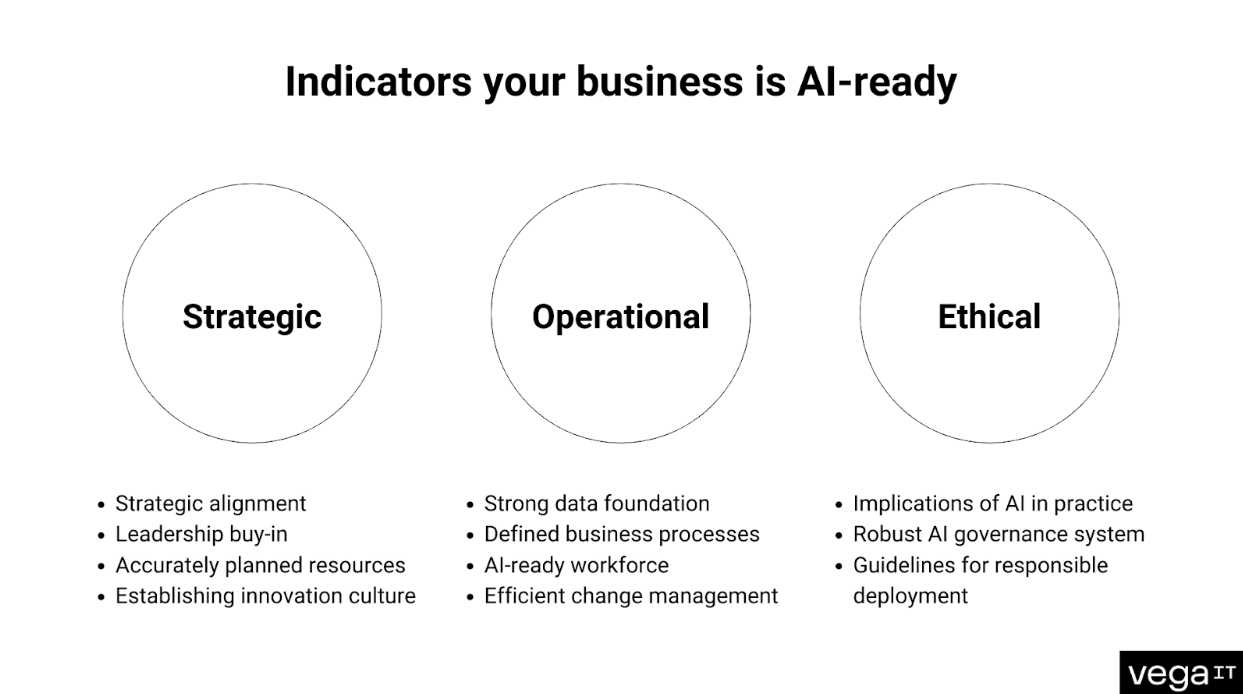FREE CHECKLIST: Evaluating your business readiness for data science and AI

Just like any other technology, AI is merely a tool. A means to an end, if you will. It is not a solution by default, and you cannot implement it in your organization and expect things to work perfectly. There is no magical “flip-on” switch for this.
Instead, AI is important building block for your business growth. What you make with it is entirely up to you. This is both good news and bad news.
- The good news is that you can do almost anything you want. This is not an exaggeration. The use cases and applications of AI are incredibly broad.
- The not-so-good news is that you first have to understand the problems you want to solve and make sure your business is ready for the revolution these technologies can bring.
It is critical to evaluate your business's AI readiness. Read this guide to learn how.
| Bonus: Download our checklist to evaluate your business readiness for data science and AI. |
Understanding AI readiness
Before we dive in deep to discuss how you can understand the current position of your business, let’s make sure we have a shared understanding of what AI readiness actually is.
Your business is AI-ready if you have the right data ecosystem, internal expertise, and mechanisms to minimize or remove barriers that would limit your use of AI. This also covers strong data governance, modeling, and integration.
In this context, having an AI strategy is important because it gives every stakeholder much-needed clarity and ensures everyone’s on the same page. It should define your business objectives and explain how they support your company’s vision and long-term goals. Only then can you work on the “how” part and identify the resources you’ll need. When done right, your AI strategy will create room for innovation.
When it comes to AI readiness, another important piece of the puzzle is the ethical and responsible use of AI. This includes:
- making sure you’re developing AI ethically and preventing biases
- complying with laws and regulations related to data privacy, security, and the use of AI
- using governance frameworks to identify, evaluate, and mitigate risks associated with AI (e.g., data breaches, inaccuracies of the model)
Signs that your business is AI-ready
If you’ve identified your business objectives and problems you want to solve, then you have the “why” behind the implementation of AI and data science technologies. This is a good sign of having a strong strategic direction.
Additionally, you need to have leadership buy-in. Nothing happens without the support of the top management, especially when it comes to introducing new processes and organizational changes.
There is a list of indicators that your business is AI-ready. We can group them into three categories: strategic, operational, and ethical.
Check out the visual below for more examples of each category.

Checklist for evaluating AI-readiness
We covered the signs that your business is ready to implement AI. Now that we have the “what,” we’ll dive in deeper and give you the “how.”
Here are some examples of questions you need to ask yourself to evaluate AI readiness:
- Have you clearly identified the business objectives that AI will address?
- Have you pinpointed specific problems you aim to solve with these technologies?
- Is there alignment between AI initiatives and the overall business strategy?
- Do top management and key stakeholders support the AI initiatives?
- How will you address change management and support innovation and AI adoption?
To get truly valuable answers, you need to gather the right people. This includes C-level executives, department heads, ethics and compliance officers, and project managers or change management professionals. In a nutshell, it has to be a highly cross-functional team that includes employee representatives as well. You cannot assess AI readiness in a vacuum.
Prefer having a worksheet? Download the checklist of strategic questions you need to answer to audit your organization.
Addressing challenges proactively
What if you go through the checklist and realize your business is not AI-ready? That’s actually great because you’ve made the first step to becoming ready. Many companies are under pressure to get started with AI because they feel like they are falling behind.
The truth is that implementing AI and data science solutions takes time. But it’s an upfront investment that pays off long-term. Realistically, assessing where you are right now is necessary for meaningful AI implementation. It’s the only way you can map out skill deficiencies in your team or data collection practices that need to be tightened up before you bring AI into the picture.
In the table below, you can see challenges, along with hypothetical scenarios and proposed solutions.
| Challenge | Hypothetical scenario | Potential solution |
| Data quality and availability | Your business has data, but it's fragmented, inconsistent, or incomplete. For example, you might run an e-commerce company and want to use AI to predict customer preferences, but your data is scattered and lacks standardization. | Audit your data to identify gaps and inconsistencies. Invest in data integration tools to consolidate data from various sources. Implement data cleaning processes and data governance frameworks to ensure your data helps |
| Lack of internal expertise and/or interest in AI | Let’s say you run a manufacturing company, and you want to implement predictive maintenance. This is challenging because you don’t have the internal interest or expertise to develop, implement, or adopt AI solutions. | Hire external AI consultants or outsource AI projects while you build internal capabilities. Create an AI task force to advocate for new technologies and benefits of AI for each individual employee. Focus on education, communicate early and often. |
| Cultural resistance fueled by fear that job positions will become redundant | An insurance company might decide to implement AI to automate claims processing. However, this creates tension because employees start worrying about their job security. | Communicate transparently about the benefits of AI and how the roles will be impacted. If certain tasks become redundant, make sure to provide training for employees to get them ready for new roles. Do not isolate employees. Make them feel heard and included, and explain what’s in it for them. |
| Bias in AI and lack of policies | A hiring platform starts using AI to screen resumes. However, AI unintentionally favors certain demographics due to biased training data. The hiring process becomes highly unfair and discriminatory. | Make sure to audit your AI systems for biases on a regular basis. Your training data has to be diverse enough to be used to train AI models. Practice accountability and transparency rather than covering up mistakes if unfortunate situations occur. |
When it comes to AI implementation, timing matters
Integrating AI into business operations is a no-brainer. It’s challenging to name even one company that doesn’t rely on AI in some capacity. It’s not a question of “why” but of timing for optimal implementation. The best time was yesterday. The second best is now.
You might feel the urge to get the ball rolling, but we’d invite you to take a step back and see what’s your starting position. Even the smallest adjustments within your organization can lead to correcting the course of action and you reaping the benefits you deserve.
This is why strategy matters. If you want to accelerate the process of getting to the point where your business is AI-ready, we have just the thing: contact Vega IT for more details.



